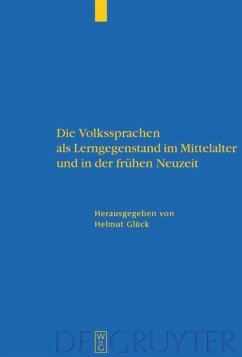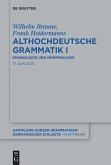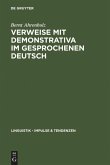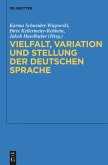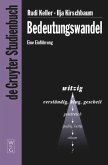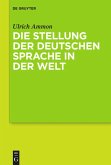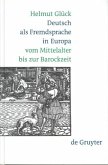Emphasis on the subject of "German as a foreign language" has increased in formal schooling in recent years. Today, linguists are not the only ones to regard research on second-language acquisition as one of the most promising fields of inquiry in the discipline. However, the history and tradition of this subject area are still largely unexplored. The great importance of learning German goes back to early medieval times. Regular teacher's manuals have existed since the 15th century, with German language instruction in schools and textbooks for learners of German dating from the 16th century. This volume of readings address the questions of whether, to what extent, and in what ways vernacular German was taught and learned in the Middle Ages and the early modern period.
Das Fach "Deutsch als Fremdsprache" hat im Verlauf der letzten Jahre im akademischen Unterricht zunehmend an Bedeutung gewonnen. Nicht nur unter Linguisten wird die Zweitspracherwerbsforschung heute als eines der vielversprechendsten Forschungsfelder der Sprachwissenschaft angesehen. Geschichte und Tradition dieses Arbeitsgebietes sind bislang jedoch weitgehend unerforscht. Denn schon im frühen Mittelalter hat das Erlernen des Deutschen eine große Bedeutung, spätestens seit dem 15. Jh. gibt es regelrechte Lehrwerke für die Hand des Lehrers, seit dem 16. Jh. kennt man den schulischen Deutschunterricht und Lehrbücher für Schüler. Dieser Sammelband widmet sich der Frage, ob, in welchem Umfang und wie in Mittelalter und Früher Neuzeit die Volkssprache Deutsch als Fremdsprache gelehrt und gelernt wurde.
Das Fach "Deutsch als Fremdsprache" hat im Verlauf der letzten Jahre im akademischen Unterricht zunehmend an Bedeutung gewonnen. Nicht nur unter Linguisten wird die Zweitspracherwerbsforschung heute als eines der vielversprechendsten Forschungsfelder der Sprachwissenschaft angesehen. Geschichte und Tradition dieses Arbeitsgebietes sind bislang jedoch weitgehend unerforscht. Denn schon im frühen Mittelalter hat das Erlernen des Deutschen eine große Bedeutung, spätestens seit dem 15. Jh. gibt es regelrechte Lehrwerke für die Hand des Lehrers, seit dem 16. Jh. kennt man den schulischen Deutschunterricht und Lehrbücher für Schüler. Dieser Sammelband widmet sich der Frage, ob, in welchem Umfang und wie in Mittelalter und Früher Neuzeit die Volkssprache Deutsch als Fremdsprache gelehrt und gelernt wurde.

